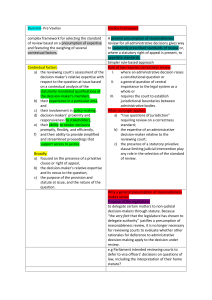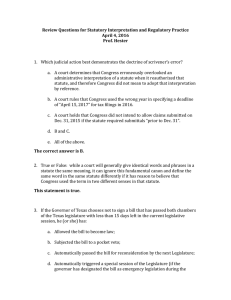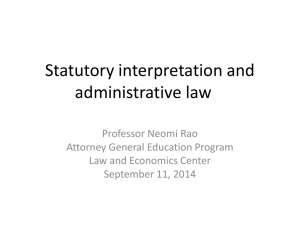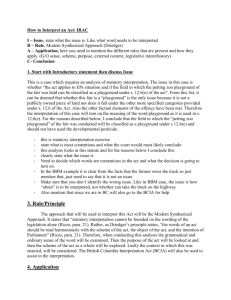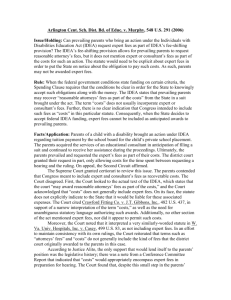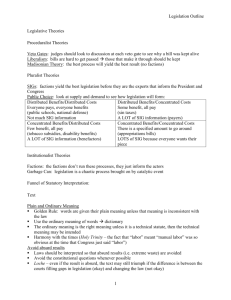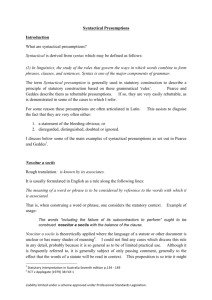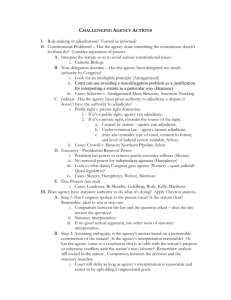Canons-of-Interpretation
advertisement
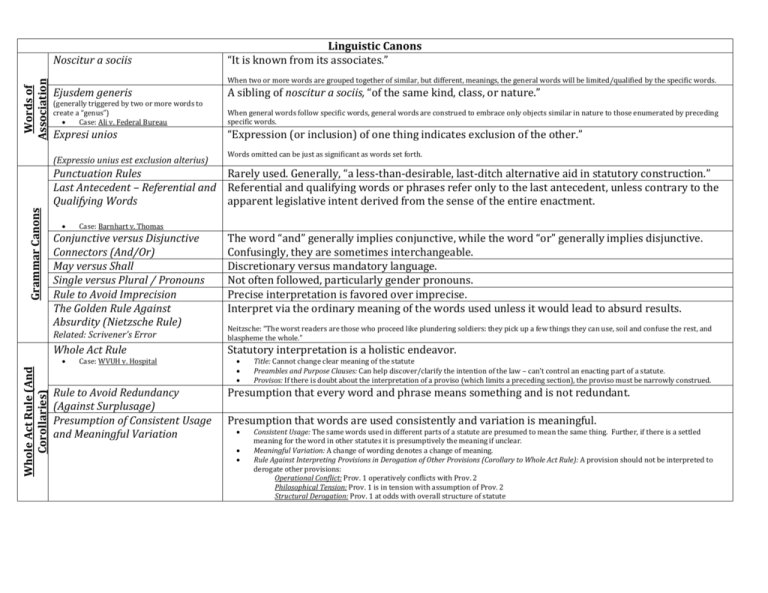
Words of Association Noscitur a sociis Linguistic Canons “It is known from its associates.” When two or more words are grouped together of similar, but different, meanings, the general words will be limited/qualified by the specific words. Ejusdem generis A sibling of noscitur a sociis, “of the same kind, class, or nature.” (generally triggered by two or more words to create a “genus”) Case: Ali v. Federal Bureau When general words follow specific words, general words are construed to embrace only objects similar in nature to those enumerated by preceding specific words. Expresi unios “Expression (or inclusion) of one thing indicates exclusion of the other.” (Expressio unius est exclusion alterius) Words omitted can be just as significant as words set forth. Grammar Canons Punctuation Rules Rarely used. Generally, “a less-than-desirable, last-ditch alternative aid in statutory construction.” Last Antecedent – Referential and Referential and qualifying words or phrases refer only to the last antecedent, unless contrary to the Qualifying Words apparent legislative intent derived from the sense of the entire enactment. The word “and” generally implies conjunctive, while the word “or” generally implies disjunctive. Confusingly, they are sometimes interchangeable. Discretionary versus mandatory language. Not often followed, particularly gender pronouns. Precise interpretation is favored over imprecise. Interpret via the ordinary meaning of the words used unless it would lead to absurd results. Related: Scrivener’s Error Neitzsche: “The worst readers are those who proceed like plundering soldiers: they pick up a few things they can use, soil and confuse the rest, and blaspheme the whole.” Whole Act Rule Statutory interpretation is a holistic endeavor. Whole Act Rule (And Corollaries) Case: Barnhart v. Thomas Conjunctive versus Disjunctive Connectors (And/Or) May versus Shall Single versus Plural / Pronouns Rule to Avoid Imprecision The Golden Rule Against Absurdity (Nietzsche Rule) Case: WVUH v. Hospital Rule to Avoid Redundancy (Against Surplusage) Presumption of Consistent Usage and Meaningful Variation Title: Cannot change clear meaning of the statute Preambles and Purpose Clauses: Can help discover/clarify the intention of the law – can’t control an enacting part of a statute. Provisos: If there is doubt about the interpretation of a proviso (which limits a preceding section), the proviso must be narrowly construed. Presumption that every word and phrase means something and is not redundant. Presumption that words are used consistently and variation is meaningful. Consistent Usage: The same words used in different parts of a statute are presumed to mean the same thing. Further, if there is a settled meaning for the word in other statutes it is presumptively the meaning if unclear. Meaningful Variation: A change of wording denotes a change of meaning. Rule Against Interpreting Provisions in Derogation of Other Provisions (Corollary to Whole Act Rule): A provision should not be interpreted to derogate other provisions: Operational Conflict: Prov. 1 operatively conflicts with Prov. 2 Philosophical Tension: Prov. 1 is in tension with assumption of Prov. 2 Structural Derogation: Prov. 1 at odds with overall structure of statute Substantive Canons Miscellaneous Strict construction when derogation of sovereignty Strict construction of public grants Strict construction of (some) revenue provisions – construed in favor of taxpayer against state Presumption against diminishment of American Indian rights Presumption that statute won’t… violate international law violate treaty obligations apply extra-territorially apply retroactively unnecessarily intrude into traditional state responsibilities withdraw the court’s traditional equitable discretion withdraw remedies or judicial relief re: statutory right Presumption of judicial review Presumption against derogation of traditional Presidential powers Rule of Lenity (Criminal Cases) If punitive statute does not clearly outlaw private conduct, the private actor cannot be penalized. Terms: Malum prohibitum (bad because prohibited) versus… Malum in se (bad by nature) Mens rea (guilty mind) Justifications: Fair notice (McBoyle v. United States – Holmes holds that stolen airplane not construed as “motor vehicle” due to Lenity) Mens rea as a presumptive requirement for criminal penalties Only popularly elected congress has right to moral condemnation (courts don’t have power under common law to do so according to Marshall US v. Wiltberger) Case: Muscarello v. US Skilling v. US (penal statute must define (a) w/ sufficient definiteness that ordinary people can understand what is prohibited and (b) won’t encourage arbitrary enforcement Constitutional Avoidance Case: NLRB v. Catholic Bishop (Holds NLRB collective bargaining rule does not apply to parochial schools to avoid constitutional question). Fair Housing Authority v. Roommate.com (Holds private persons can discriminate under FHA rules to avoid constitutional questions re: freedom of association). When possible, penal statutes (all statutes?) will be interpreted narrowly to avoid constitutional questions.
